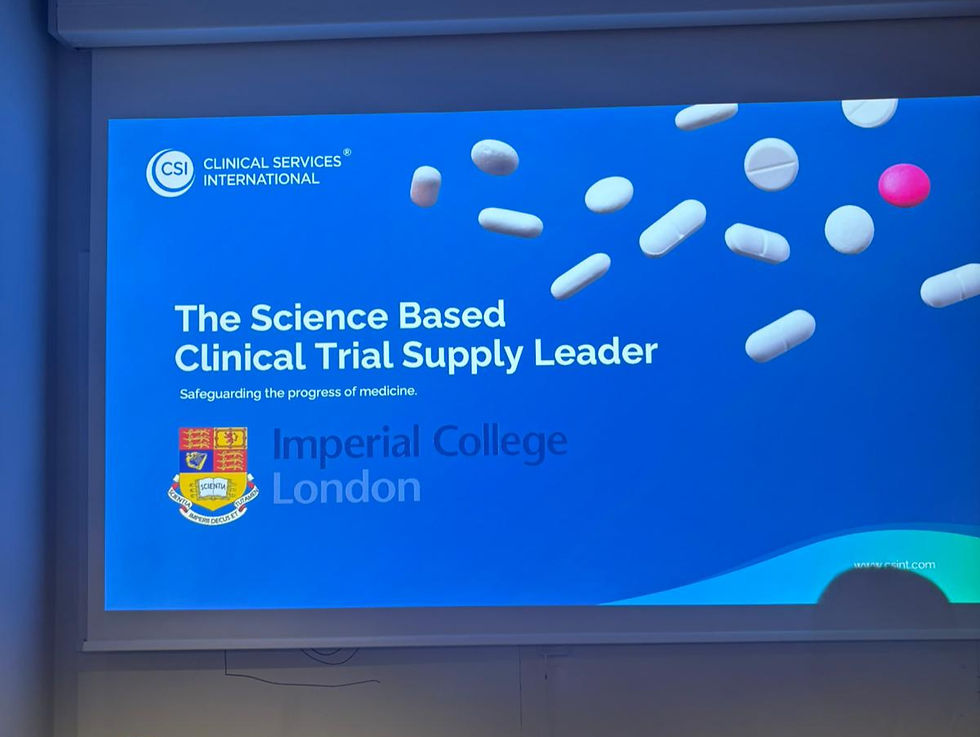Innovation delivered: Oncology drug development
- Vanessa Dekou

- Jan 22, 2021
- 3 min read
Updated: Jan 26, 2024
Innovation in oncology drug development is granting cancer patients access to life-changing therapies. The industry continues to conduct incredible research and clinical trials to improve patient outcomes globally.

Why do we need innovative drug development?
More progress has been made in the past 5 years than ever before. Over the past five years, 61 cancer drugs, each approved in one or more tumours, have impacted the treatment of 23 different cancer types. The rise in immuno-oncology drugs since 2014 has been largely centred on the PD-1 and PD-L1 mechanisms which are used across 23 different tumour types.
The range of clinical benefits from new medicines includes several with total remission rates above 50% and significant extensions of overall survival. As well as some with incremental survival benefits in tumours where those rates were already extremely high. However, despite detection and prevention improving for most cancers, some remain resistant to treatment.
Innovative new medicines are required to attack cancers in ways that existing medication on the market does not. New therapeutics can work alone or in unison (combination) to overcome cancer types that appear to be resistant to drugs. Technology improvements and access to patients with different cancer types provide a deeper understanding of cancer.
This presents opportunities to create approvable drug development processes for new therapeutics. Even where innovative new drugs are created, they must be able to reach patients efficiently and cost-effectively to make the investment into drug development worth the risk.
What is the risk to innovation?
While innovation in oncology drug development is needed, there are many risks that make the development process challenging for companies to overcome. Return on investment One of the biggest challenges with innovation in oncology drug development is proving that investment into drug development is worth the risk. Companies often view the risks of innovation too high which makes the benefits questionable. . There is a critical need to bring new, innovative medicines to market quickly and safely while generating a return on investment. In addition, clinical trials are complex and costly and reimbursement can be very challenging for the already under stress health systems all over the world. Regulatory and approval processes Typically, the higher the level of innovation of an oncology drug, the longer it takes to pass through the clinical trial pipeline and into approval processes, Strict regulations slow down the ability to push treatments through the clinical trial to ensure it gains approval in a timely manner. According to an assessment conducted by The Institute of Cancer Research in 2020, the most innovative cancer drugs took a further 3.2 years to reach NHS patients after filing the patent of the drug.
There is a need to streamline regulatory requirements and licensing for the most innovative drugs to ensure they move through the clinical trial pipeline efficiently. This would allow time for appraisal and approval and minimise the time patients must wait to receive treatments for rare cancers. Providing early efficacy Knowledge and understanding of cancer is advancing as technology improves and patients with cancers likely to respond to new treatments come forward. Researchers often take on early drug discovery work as the risk is lower compared to companies that must develop the drug and take it to trial.
Often innovation comes from academia. Providing early evidence of efficacy may support the approval process (fast track) while clinical benefit based on absolute evidence is established. In addition collaboration and partnerships between academia and industry are vital for successful and timely drug development.
How do we overcome the risks to innovation?
Sharing the risk of innovation in oncology drug development has been suggested as a way to encourage more drugs are brought to clinical trials. Responsibility could be shared between the government, charities, industry, and academia to minimise risk to one stakeholder. All have a role to play in supporting innovation in drug development so working together to make the process more efficient and cost-effective will improve rates of success.
CSI safeguards the progress of oncology development. CSI is committed to supporting innovation in oncology drug development through our supply chain design and management services. We minimise wastage and ensure sites have sufficient medication so the clinical trial supply chain is seamless and delivers value. We also have outstanding expertise in branded, generic and biosimilar oncology medicines and direct access to almost all major manufacturers. Contact us to discuss how CSI can proactively manage your studies so you can focus on delivering innovative therapies to patients in need.
Summary
We continue to expand our knowledge to bring better therapies to market efficiently and effectively. Treatments for cancer have been advancing at an accelerated pace in recent years. Offering significant improvements in clinical benefit and increased specificity through selection according to biomarkers or through engineered cell or gene therapies.




.png)
Comments